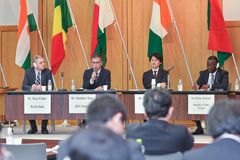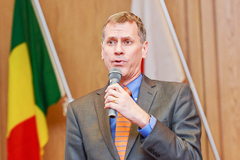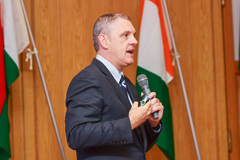Public Symposium by JICA and the World Bank— Improvement of children’s learning through local community and school collaboration— ‘From experience of “School for All” Project and evidence from the world’
2016.12.28
Discussing importance and methods of utilization of evaluation at the “School for All” Symposium: Senior Research Fellow Kozuka and Co-Directors of the World Bank
Since 2004, the Japan International Cooperation Agency (JICA) has implemented the “School for All” Project to improve children's learning through community participation in school management with a focus on Western Africa. Education will also be raised as a theme in the World Development Report (WDR) 2018 which will be issued by the World Bank at the end of 2017. In response to these developments, JICA and the World Bank held a public symposium entitled “Improvement of children's learning through local community and school collaboration—‘From experience of ‘School for All’ Project and evidence from the world’” at the JICA Ichigaya Building on November 21, 2016.

Senior Research Fellow Eiji Kozuka (third from left)
The symposium also featured participation by World Bank Co-Directors in charge of the WDR, Masahiro Hara, former Chief Advisor of the project, and JICA-RI Senior Research Fellow Eiji Kozuka (Director of Basic Education Team Human Development Department, JICA), who evaluated the impact of the project. A discussion was held regarding the evaluation of the project and methods for utilizing that evaluation.
Hara, who developed the model for the project, explained its outline and effects. Hara reported on the process of revitalizing a non-functional school management committee through the activities of democratic elections, school plans, and collective monitoring and creating a sustainable model. He also discussed how the process resulted in an increased access to schooling and a trusting relationship with the community. Finally, Hara reported on activities for improving the quality of education; specifically, how cooperation had been obtained from the community in order to increase learning hours, how arithmetic drills were held outside of school, and how scholastic results had improved.
Kozuka introduced the impact evaluation performed in Niger and reported: “When comparing efforts to improve children's learning by a group which implemented school subsidies and a group which held training for the school management committee in addition to subsidies, the latter group showed increased support from families and produced tangible results such as increased averages for testing on arithmetic and French…In the future, accumulating and utilizing projects based on evidence created from impact analysis will be viewed with greater importance internationally.”

Halsey Rogers, Co-Director of the WDR 2018
Prior to the presentations by Hara and Kozuka, Deon Filmer and Halsey Rogers, both Co-Directors of the WDR 2018 took to the podium to discuss measures for reforming children's learning. Filmer and Rogers explained how the Millennium Development Goals (MDGs) particularly emphasized its focus on access to schooling, and how that goal had been achieved to a certain extent. However, they also pointed out how the Programme for the Analysis of Education Systems (PASEC), which was conducted in a number of West African Countries, indicated that the end-of-primary school cycle math results (Grade 6) are insufficient for continued successful learning. They discussed how even after becoming able to attend school, a majority of children were not learning at the school, which they call a “learning crisis.” The lack of preparation by families prior to school enrolment, the lack of teachers, and a low level of community involvement in schools were stated as the causes of this crisis.
Regarding the project impact evaluation for intervention on learning outcomes, Filmer and Rogers introduced the fact that the number of studies implemented increased from only 32 in 2000 to 227 in 2014. They also explained how it is important to focus on why interventions worked, rather than simply considering one particular intervention that was done in one place, and assuming that one model can be applied anywhere in the world. Furthermore, as an even more vital concept, they discussed the need to recognize the biggest gap between what the evidence suggests should be done and what is actually put into practice at most schools. Such recognition would provide an understanding for the intervention which produces the biggest impact.
Next, a lively debate was held during the subsequent panel discussion, featuring participation from Kabran Assoumou, Director of Cabinet, Ministry of National Education, Republic of Côte d'Ivoire. In the discussion, Filmer presented successful examples from countries such as the Philippines and Pakistan. He explained that disclosing information such as how the subsidies for school management are used, the academic records of students, and the average scores for that region to the residents had a big impact, and led to community involvement in school management. Kozuka also raised the following point: “Depending on the implementation method, community involvement in school management has the potential to further increase disparities. In one country, priority was given only to boys and children good at studying when using cash subsidies. It's important to prevent such disparities.”

Deon Filmer, Co-Director of the WDR 2018
Filmer and Rogers came to Japan in order to attend this symposium, as well as the WDR 2018 Consultation Meeting which was held at the JICA Ichigaya Building for a two-day period starting on the same day as the symposium. The consultation meeting was attended by researchers from JICA-RI and other institutions who shared the knowledge of JICA and the research results of JICA-RI and other Japanese research results with the World Bank Co-Directors. The JICA-RI research results presented at the meeting included an impact analysis of the “School for All” Project in Burkina Faso and Niger, analysis of cross-border higher education for regional integration and the labor market in East Asia, and research results on disability and education.

事業事前評価表(地球規模課題対応国際科学技術協力(SATREPS)).国際協力機構 地球環境部 . 防災第一チーム. 1.案件名.国 名: フィリピン共和国.

事業事前評価表(地球規模課題対応国際科学技術協力(SATREPS)).国際協力機構 地球環境部 . 防災第一チーム. 1.案件名.国 名: フィリピン共和国.

事業事前評価表(地球規模課題対応国際科学技術協力(SATREPS)).国際協力機構 地球環境部 . 防災第一チーム. 1.案件名.国 名: フィリピン共和国.

事業事前評価表(地球規模課題対応国際科学技術協力(SATREPS)).国際協力機構 地球環境部 . 防災第一チーム. 1.案件名.国 名: フィリピン共和国.

事業事前評価表(地球規模課題対応国際科学技術協力(SATREPS)).国際協力機構 地球環境部 . 防災第一チーム. 1.案件名.国 名: フィリピン共和国.
scroll